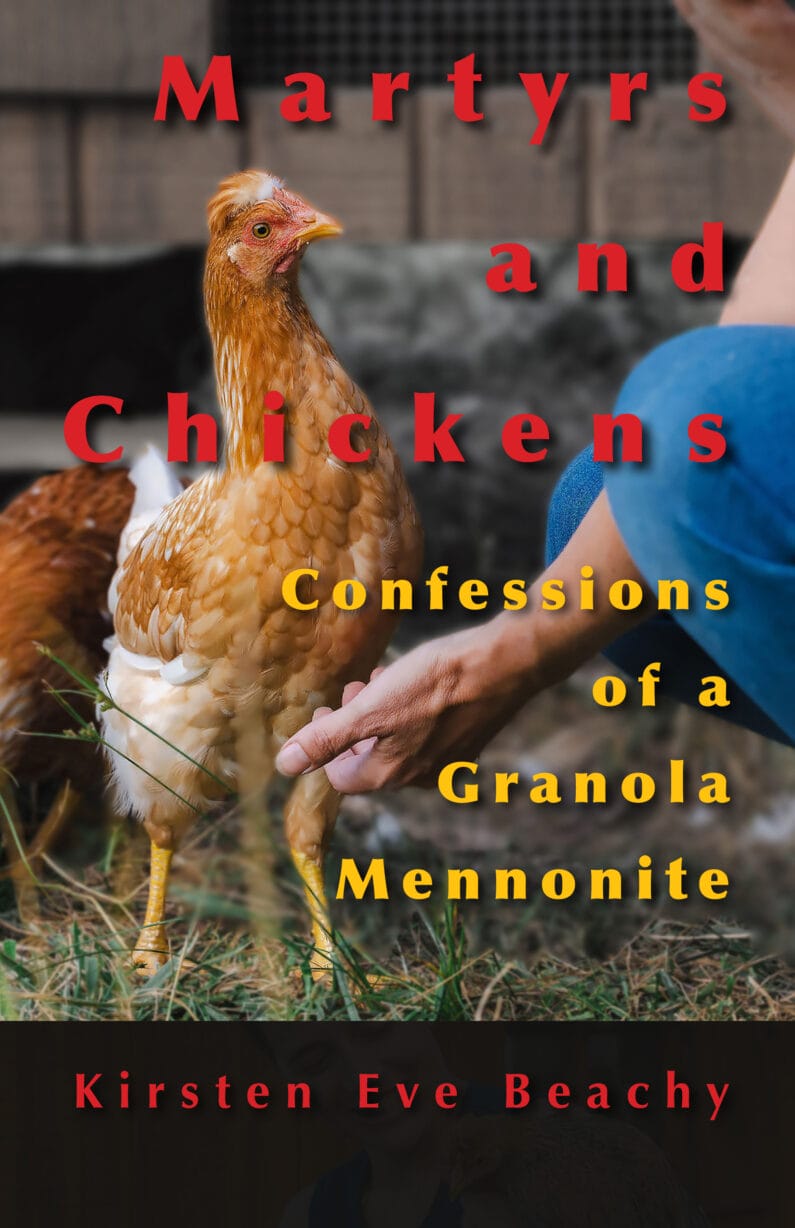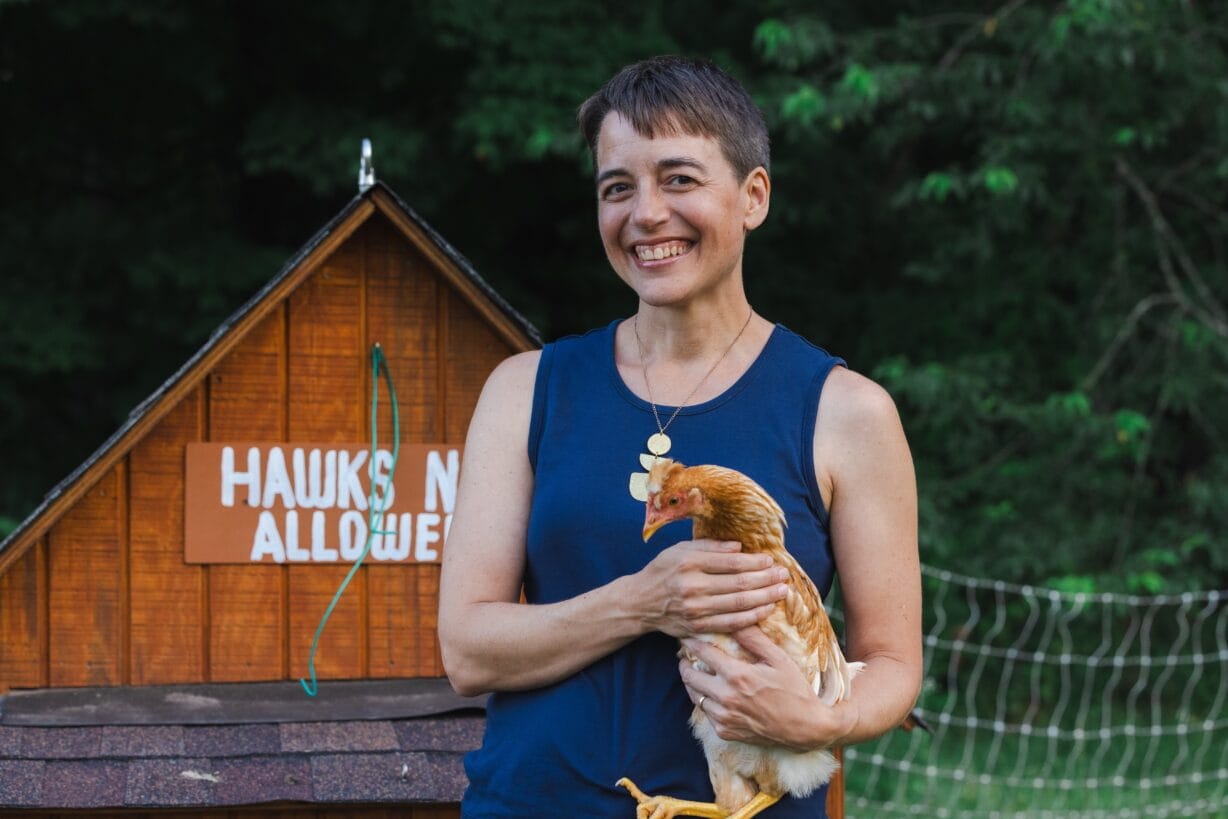By Esther Stenson, contributor
Reading in the Burg is a monthly column in 2025 about connecting with books and taking in Harrisonburg’s literary scene.
~ Beachy, Kirsten Eve. Martyrs and Chickens: Confessions of a Granola Mennonite. Cascadia, 2025~

What do martyrs have to do with chickens? Do chickens whose heads are sacrificed on the chopping block classify as martyrs–like Mennonites who were persecuted during the Reformation in Europe? And what exactly is a granola Mennonite? Are there granola Lutherans or Presbyterians? These were some of the questions that popped into my head as I pondered the title.
Throughout her collection of essays, Kirsten Beachy frequently references chickens and martyrs, revealing her (and her husband Jason’s) Mennonite family story and her own movement from a more conservative background to where she is today. Her experiences and observations are clearly positioned in her creative Mennonite self as she explores and questions Mennonite martyr history, delights in the natural world including a family farm, her own wild spaces, and then delves into her complicated experiences with trying to conceive, give birth, and be a wife and mother. Finding it difficult to distill this articulate, surprising collection into a brief summary, I will comment on only some of the ways I relate to her stories.
As someone who has journeyed from my childhood as an Amish Mennonite to a more open position, I could visualize her imaginary conversation with a curious colleague/companion who “squints over your shoulder, looking for the horse and buggy” when you reveal that you are Mennonite. To show the complexity of the family of Mennonite, she instructs: “Say there are all sorts of Mennonites, but you’re a modern Mennonite…. After all, you’ve got a liberal arts education, cable Internet, and subscriptions to the New Yorker and Scientific American.” Beachy’s ironic wit comes through when she refers to a martyr predecessor, “Maeyken Wens, who was so persuasive the authorities clamped her tongue with a tongue screw so she couldn’t evangelize on her way to her death….Admire, but do not mention, your companion’s tongue piercing,” she says. Her fascination with the book Martyr’s Mirror is shown by her inclusion of the tome on her wedding gift registry. As a keepsake, I rescued a German version of the book from the leavings of my Yoder grandfather.
Whether it is stripping fat corn cobs from stalks to freeze for the winter, butchering chickens, or trying to avoid manure laden cow tails in a milking parlor on Jason’s family farm, I can relate. I grew up on a small farm where all of those things took place. I enjoyed working and chatting in the kitchen on “corn day” with my sister. Butchering chickens was less fun. However, Beachy’s description IS fun. “The slop bucket soon filled with kindergarten colors, swarmed by iridescent flies: Yellow feet, bright red combs. Pink, purple, and blue viscera. Green bile. Brown bits. White feathers.” This essay reminds me of the story “Chicken” written with great humor by Garrison Keillor (in Leaving Home).
Though beautifully descriptive of outward details, Beachy’s accounts of events and experiences are about much more. For example in the essay “Milk,” her telling the process of milking cows is interspersed with her struggle to understand the meaning of being a woman. Her mother won’t give her answers. Beachy concludes, ”this is the gift my mother gave to me: a door wide open.” My Amish mother gave me a similar gift. Wondering aloud whether I would be able to succeed if I accepted an offered position at a university, Mom said to me: “Oh Esther, you can do anything you want to.” My mother’s words felt, to me, like a door wide open.

The playful essay titled “Field Notes Toward a Doctrine of Chicken,” is riveting. Here Beachy describes the spiritual benefits of watching chickens with subtitles like Petition, Communion, Original Sin, and Salvation. She concludes: “They teach me that I do not need so much, that it takes little to be deeply grateful, something as small as a fresh warm egg in my hand. When I watch them, peace settles.” I feel similarly when I watch the graceful flight of a blue heron, a shifting sky, a cresting porpoise—the list goes on. This essay is not for people who like to have their theology neatly arranged in a box.
Beachy’s detailed, and sometimes tortuous account of trying to conceive children is interspersed with chicken and duck references. Reading about her journey, you may learn exotic new vocabulary like hysterosalpingogram and tenaculum. I do not have biological children myself but have spent a lifetime nurturing other people’s children. Like Beachy, I have taught, fed, listened to, lost sleep over, laughed with, and loved those I have known.
Still, I’m not sure I could claim the fierce maternal love Beachy expresses in the powerful essay, “To the (Unattributed) Mennonite Pastor who said the Children are for Martyrdom.” Here, she demonstrates all the efforts and love poured out by her family and community in helping her and Jason navigate the birth and growth of mismatched twins—one having downs syndrome. She also interrogates the Mennonite teaching on turning the other cheek, with the story of Helena Von Freyburg who escaped rather than stay and turn her cheek. She asserts that the question isn’t : What are children for, but “ how to let go and let them do what is already in their hearts to do.” Indeed, I’ve had to learn to let go many times.
In three essays, Beachy reflects on times when the creative muse lies dormant, with no time or energy to “really write.” That is something I believe all writers can relate to. Deaths, pandemics, children, jobs, politics, living off the land, and other things demand all of her attention. That’s where dance was and is essential for her family’s well-being. I wish I had had more of that in my life. Perhaps it’s not too late.
I wondered, while reading the book, if Beachy still has the energy to live into her theme song, “Tis a Gift to be Simple. She gives no simple answer. After creating her “Granola Mennonite Dream Score card,” she asks,” Are any of us free from this frantic sense that more must be done?”
Beachy reveals her tender side not only in writing about her family, but also in how she sang to a dying cow and how she made a tiny “foot” for a baby duckling born with a deformed limb. What comes through most clearly, however, is Beachy’s response to a “Voice” she sensed at a Martyr’s Mirror conference that gave her a vision for her writing: “Do you solemnly swear or affirm to tell the truth, the whole truth, and nothing but the truth…and make it interesting?”
In this book she has clearly achieved that goal. Whether you are Mennonite or not, young or old, a parent or not, you will keep turning the pages because the language, the humor, the wisdom, and the surprises will keep you fascinated throughout.
Upcoming book talks:
• Tues., April 22 at 7:30pm. Eastern Mennonite University Writer’s Read.
• June 8, 2025 at 6:00. Author’s Night at Ridgeway Mennonite Church, Harrisonburg.
Guest columnist Esther Yoder Stenson is a local author and instructor at Eastern Mennonite University.
Thanks for reading The Citizen, which won the Virginia Press Association’s 2022 News Sweepstakes award as the top online news site in Virginia. We’re independent. We’re local. We pay our contributors, and the money you give goes directly to the reporting. No overhead. No printing costs. Just facts, stories and context. We value your support.












